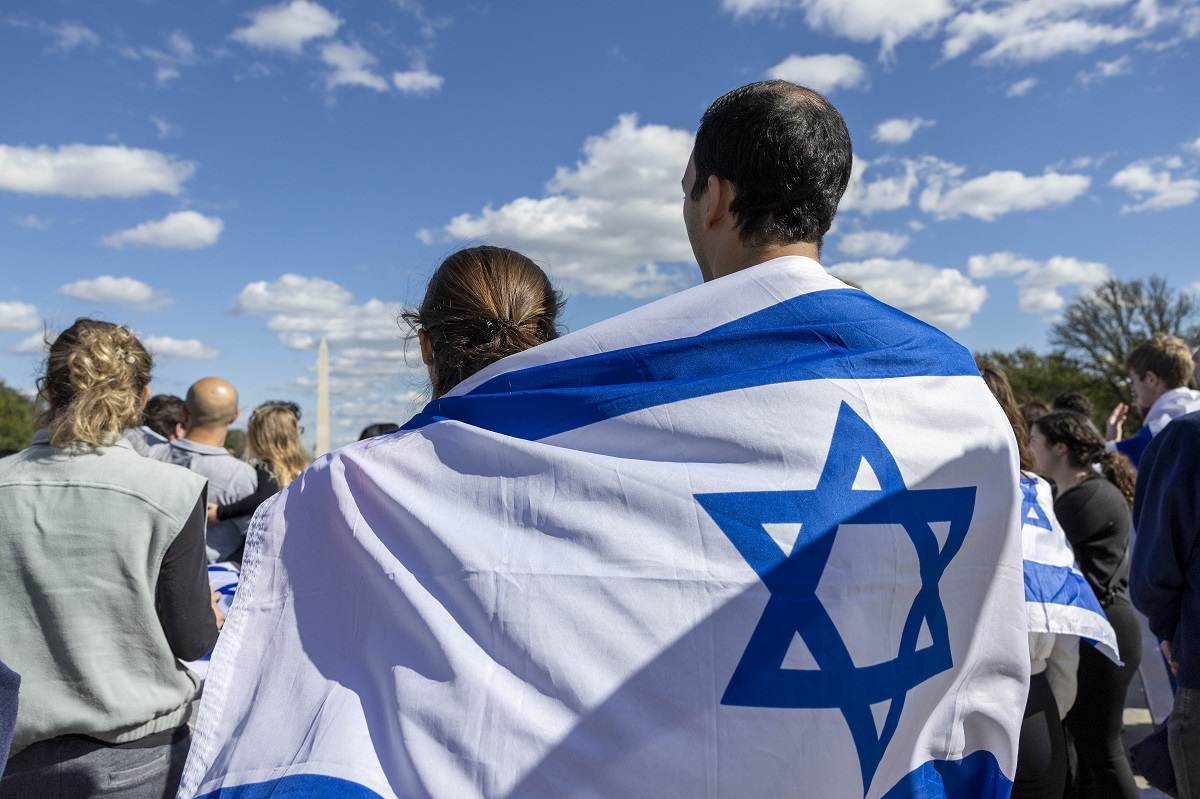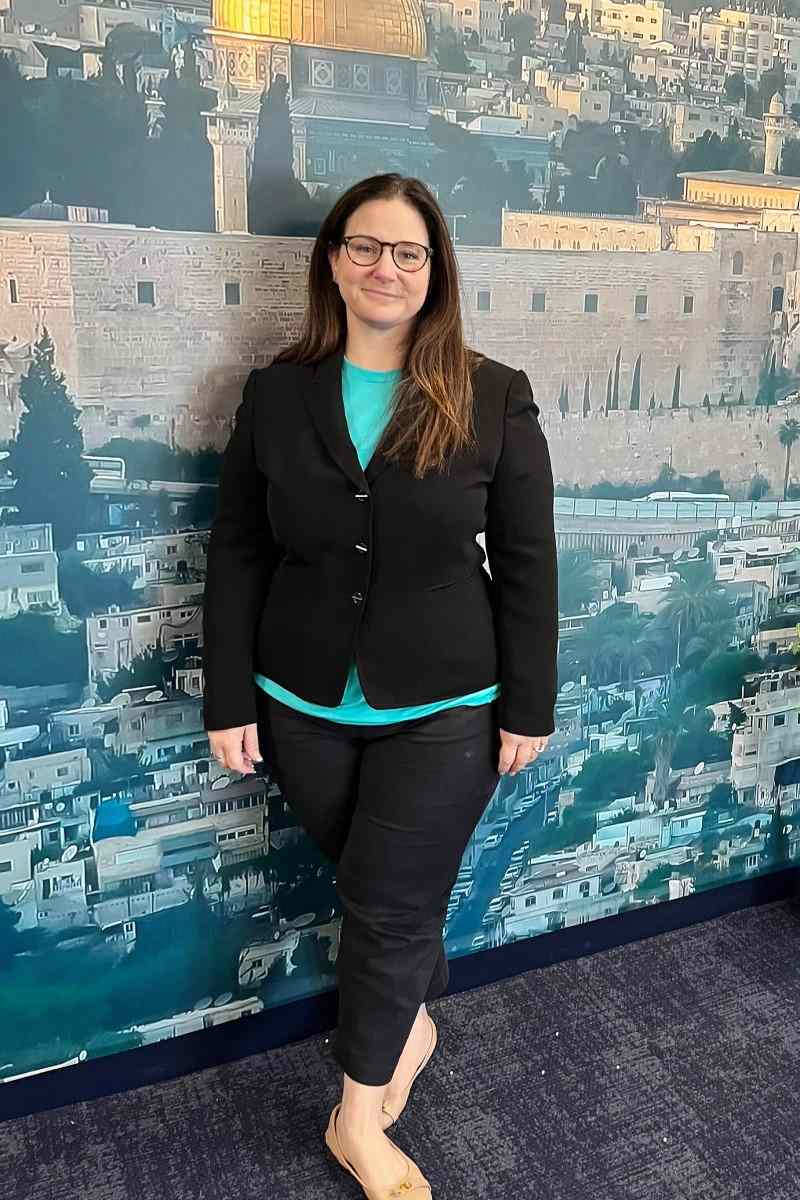
People gathered on the National Mall in Washington, D.C., on Sunday to express support for Israel.
17:30 JST, October 9, 2023
Just a few weeks ago, before a huge Rosh Hashanah audience, Rabbi Rachel Timoner thundered from the pulpit of her large Brooklyn synagogue against the government in Israel.
The Jewish state’s current leaders, she said, were welcoming violent racists and trying to dismantle democracy and pluralism. American Jewry’s liberal majority, she said, must fight back. “Two coalitions. Two versions of Judaism. Two visions for the Jewish people, in direct conflict,” she said, prompting applause and eventually a standing ovation – both rare sights in synagogue.
This weekend, Timoner was laser-focused on prayer and support for Israel and its government, which experienced some of the deadliest and most terrifying days in the country’s history during continued attacks and hostage-taking by the group Hamas. She feels consumed with grief and terror for Israelis, and she wants to show them they’re not alone.
“I’ve given five sermons just this year very harshly critical of the Israeli government, and my whole career I’ve spoken about the [Israeli] occupation. But this is not that time,” Timoner told the The Washington Post on Sunday. “This is not a ‘both sides’ time.”
The Hamas ambushes, which have left some 700 dead in Israel, were so violent, graphic and surprising that they stunned the American Jewish psyche, ideologically as well as emotionally. Increasingly divided in recent years about Israel’s right-wing leaders, many American Jews found themselves this weekend tapping into a vein of solidarity.
“I think that up until two days ago the conversation in the U.S. and among many American Jews was: ‘How do we engage because of concern about the future of Israel and where some of the policies are going?’ I believe that for the next several months that will no longer be a significant topic,” said Gil Preuss, CEO of the Jewish Federation of Greater Washington. “In a month the conversation may be very different.”
But while some immediately felt a setting-aside of the usual deep differences about Israel among America’s 7 to 8 million Jews, others braced for the exact opposite. Especially among the most liberal U.S. Jews – and 71 percent identify as Democratic-leaning, according to Pew Research Center – some already saw fissures over how the attacks would be understood. And pain.
Havi Carrillo-Klein, 23, who leads groups to the region to work on the overlap between conflict there and other systems of oppression, said the Hamas attacks are a “catalyst” for a greater divide. That’s because, she said, they tap into an already wide rift among U.S. Jews over whether Jews and Israel should primarily be seen today as holders of power and privilege or instead as disenfranchised and threatened. The complexity of the current situation, she said, seems destined to be divisive.
“When a progressive Jew mourns the harm on Israeli families, mourns this terrorist attack, I fear I’m not nodding to the historical context [of Israeli occupation of Palestinian land]. But if I do nod to the historical context, I fear I’ll be seen as justifying a terrorist attack, which I could never, ever do,” said Carrillo-Klein, who lives in Cleveland. “Progressive Jews feel broken. And this will only plummet us into much deeper polarization.”
Jewish communities faced not just political but also spiritual decisions this weekend, as the war erupted on a holiday that is all about joy. Simhat Torah, which marks the end and start of the holy book’s annual cycle, literally means “the celebration of the Torah,” and it is normally a time when Jews dance into the night carrying sacred scrolls. Different Jewish groups celebrate on slightly different dates, but most American Jews marked it Saturday or Sunday.
In Brooklyn’s Grand Army Plaza, Timoner’s Beth Elohim and 20 other congregations first debated canceling the commemoration of the holy day and then decided to reform it. To walk slowly in circles instead of dancing. To sing the same songs, but with somber, reflective music and prayer. Beth El Hebrew in Alexandria, Va., canceled its planned festive block party and shifted to a quieter lunch and craft event focused on Israel, where attendees sang the Israeli national anthem. Still other Jewish communities felt strongly about commemorating Simhat Torah in the traditional way.
Some significant polling of U.S. Jews shows a deep but changing relationship between U.S. Jews and Israel. In 2021, 8 in 10 U.S. Jews told Pew that caring about Israel is an essential or important part of what being Jewish means to them. However, that percentage is 71 for Jews 18 to 29 years old, compared with 87 percent among people ages 50 to 64.
Being a Jewish holiday, Sunday was relatively quiet in public conversations. Most Orthodox Jews don’t use technology on the sabbath and other holidays. There were multiple small rallies around the country, including at synagogues, outside the Israeli Embassy in D.C. and in New York City’s Times Square, where a few hundred people turned out for a Democratic Socialists of America event Sunday to support Palestinian liberation. They waved Palestinian flags and chanted “Resistance is justified.” On Saturday, New York Gov. Kathy Hochul (D) condemned the rally before it was held.
IfNotNow, a prominent Jewish group focused on ending Israel’s occupation of Palestinian land, said it watched the “unfolding horrors with heartbreak and dread” for Israelis and Palestinians.
“We cannot and will not say today’s actions by Palestinian militants are unprovoked,” it said Saturday. “We absolutely condemn the killing of innocent civilians. . . . Their blood is on the hands” of the Israeli, U.S. and other governments “who have turned a blind eye to decades of Palestinian oppression.”
While Orthodox Jews tend to be more unconditionally supportive of and connected to Israel, there has still been division among them over issues including the handling of the Palestinian conflict and the current right-wing government’s efforts to reduce the independence of the Israeli Supreme Court. While U.S. Jewish liturgy generally almost always includes prayers for the state of Israel, many Hebrew schools and rabbi sermons avoid contemporary details when they address the topic.
In Overland Park, Kan., where a neo-Nazi sympathizer shot and killed three people at the Jewish Community Center of Greater Kansas City and a nearby Jewish retirement community in 2014, Rabbi Stephanie Kramer said leaders at her Temple Congregation B’nai Jehudah made the decision to discuss the rising conflict with even some of the younger children during Hebrew school services Sunday. They wanted to meet the issue head-on, she said at the synagogue, but in an age-appropriate way.
“The images coming out are very scary,” she told The Post. “I don’t want to tell them that children and elderly are being kidnapped.”

In Overland, Kan., on Sunday, Rabbi Stephanie Kramer stood in Temple Congregation B’nai Jehudah’s “Israel room.”
Kramer then had an impromptu exchange with fourth-grade classmates of her daughter who were sitting on beanbag chairs in the synagogue’s “Israel room,” a small room wallpapered in pictures of Israel. The room was designed to be an “immersive space” for contemplation and learning about the country.
“There is fighting that has broken out in Israel. People from a neighboring place called Gaza came in without any warning and they’re trying to start a conflict, and Israel is going to have to fight back,” Kramer explained.
The children peppered her with questions. Why were the Palestinians unhappy? Were regular Israelis hiding in bunkers? Did they have enough food and water?
“Maybe if they could talk it out they could give them a little bit of land,” one student said.
At the end of the exchange, Kramer told the children to speak to their parents if they wanted to know more, and reminded them: “Remember, it’s happening pretty far away from us, but we care a lot, right?”
Michelle Adler-Wexler, an Overland Park resident and employee of the synagogue, said she was trying to help her teenage daughter navigate the conflict on social media. Madison, a high-schooler, had posted a note of support for Israel on Instagram, which quickly spread among her friend group. Another teen responded with an emoji of the Palestinian flag.
The schoolmate asked, “Why would you support Israel?” Adler-Wexler recounted.
Rabbi Mark Dratch, executive vice president of the Rabbinical Council of America – one of the world’s largest groups of Orthodox rabbis – said a period that had been complex for many U.S. Jews seemed simpler at present.
“Whatever our differences may be politically [in the Orthodox communities], when it comes to the very survival of Israel and the safety of its people, we’re all united; everything else is pushed aside immediately. Israel is a big, dysfunctional family, and in a time of crisis everyone rallies around,” Dratch said.
In the months and years after Israel’s other wars, he said, there were eventually “major political ramifications” and changed alliances among Jews in some cases. “It’s much too soon to predict anything.”
At present, he said, there is a feeling of unity similar to what he experienced after the Sept. 11, 2001, terrorist attacks.
“I think it’s a watershed in Israeli history in terms of the relationship between U.S. Jews and Israel,” he said. “That sense of vulnerability.”
In a way, Kiyomi Kowalski identifies with that.
Kowalski, who works with progressive activists on how to confront antisemitism on the left, said she had gotten out of the Marine Corps just four days before the 9/11 attacks, and “I remember really loathing George W. Bush.” But after the terrorist attacks, there was a more basic national feeling of coming together.
“Before that, I would have never said: ‘Oh, I feel comforted by my Republican neighbor.’ But then I was,” said Kowalski, who lives in Los Angeles. That feeling of unity can be “beautiful,” she said – but it depends on how it’s meted out.
“It changes the dialogue for a while because we won’t be talking about [the Israeli-Palestinian conflict] in a nuanced way,” she said.
Rabbi Rick Jacobs, leader of Reform Judaism, the largest denomination of Judaism, said the image of Jews being terrorized and murdered “does tap into a very different part of the American Jewish psyche.” A deep, ancient part, he said.
“I don’t think [the Hamas attacks] threaten the immediate existence of Israel, but it did tap into the reality that even with Israel’s strength, it’s vulnerable. . . . We all have those narratives. These are not just people of one political tribe who are in harm’s way. Everyone is in harm’s way.”
Top Articles in News Services
-

Survey Shows False Election Info Perceived as True
-

Hong Kong Ex-Publisher Jimmy Lai’s Sentence Raises International Outcry as China Defends It
-

Japan’s Nikkei Stock Average Touches 58,000 as Yen, Jgbs Rally on Election Fallout (UPDATE 1)
-

Japan’s Nikkei Stock Average Falls as US-Iran Tensions Unsettle Investors (UPDATE 1)
-

Trump Names Former Federal Reserve Governor Warsh as the Next Fed Chair, Replacing Powell
JN ACCESS RANKING
-

Producer Behind Pop Group XG Arrested for Cocaine Possession
-

Japan PM Takaichi’s Cabinet Resigns en Masse
-

Man Infected with Measles Reportedly Dined at Restaurant in Tokyo Station
-

Israeli Ambassador to Japan Speaks about Japan’s Role in the Reconstruction of Gaza
-

Videos Plagiarized, Reposted with False Subtitles Claiming ‘Ryukyu Belongs to China’; Anti-China False Information Also Posted in Japan






















